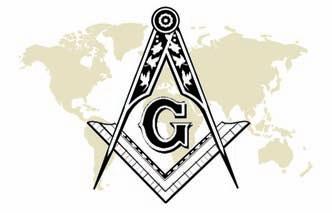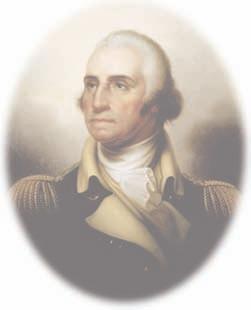
7 minute read
George Washington, The Man
Walter R. Hoenes ,
Past Master
Over the years there have been countless commemogrew more and more contentious. Historians tell us that rations of our illustrious forefather, George Americans at that time were as disunited then as any Washington, our first president and the commander-ingroup of people could possibly be. They had no unity of chief of the Continental Army – that miniscule force that purpose, few agreed goals, and even on those objectives won freedom for this country. Yes, the life of that great man supported by a majority, there was disagreement as to has been told and retold. It’s my hope that this article will how they might be achieved. At the time that Washington help add a new dimension to our collective appreciation of took over command of the Continental Army -- a rag tag Washington, the man. This concept of Washington, the outfit if ever there was one – the cause of independence man, is stressed because he was like all of us – mortal in was almost hopeless. Many, in fact, supported the Tory every sense of the word. We should honor him, emulate cause, and in good conscience. Washington was the him, and appreciate his great contriunderdog of all underdogs. Really butions to his nation and to mankind. he was an American David, or But we should always remember that he was, in the last analysis, only This great man Gideon, a warrior who put his trust in God. There was no one else to whom a man. Why then do we pay him such great homage? The answer spent his entire life he could turn. The ultimate capitulation of the may be that Washington was the British, did not, as some had hoped, most distinguished man of his time. doing his duty in an lead to the harmonious unification of Furthermore, he was a distinguished the colonies. Instead, with the end of man who fully appreciated his relationship with the Grand Architect, attempt to establish a the war, it seemed that everyone gave full time to the cultivation of his one who understood his role as an apprentice laborer in the quarry of better society. own special, selfish, and parochial interests. In time, Washington was the master. called upon once more to smooth the One wonders what Washington waters of discord, when in 1787 he would think if he could see us today. Many of us are prone was summoned to Philadelphia to chair the Constitutional to look upon the social developments of our day with alarm Convention. His character and reputation once more and apprehension. We seemingly have lost our equilibbecame the stabilizing rudder for a group that seemingly rium, and in the process, we have begun to suspect each wanted to go in several directions at once. He answered others motives, to distrust our most cherished institutions, the call of his country, yet again, by serving as its chief and to fear for our safety in a world that daily grows more executive under the new Constitution. Truly, if it had not complex and terrifying. If our times seem grave, what been for this man Washington, the fledgling republic, from would we have thought had we lived in the era of Washwhich our nation evolved, might never have been born; ington and the other founders? Consider the perspective even in the joy of military victory, many of our ancestors shared by Washington and his colleagues. were locked in a selfish economic and political struggle. Our country in the eighteenth century was a weak little outpost of western civilization, a land believed to contain immense wealth, for which the great powers vied over the course of many decades. War was a constant threat on the western frontiers, and with every passing year, relations between the several colonies and the mother country Perhaps you are asking the same question as I am: why did the colonists turn to Washington when they faced these great challenges? Personally, I am of the opinion that Washington was chosen by his countrymen because they trusted him, and they trusted him because of his selflessness, his humility, and his dedication to duty and
service. So far as can be determined, he never refused an possible. As a result, his life was one of constantly growopportunity to serve others, and as a consequence, major ing responsibilities. To him it was a duty to have portions of his life were spent away from the comforts and compassion for the other guy, to sympathize with him in satisfactions of his beloved Mount Vernon. This great man time of sorrow and to share with him his joys. This is somespent his entire life doing his duty in an attempt to estabthing that too many of us find hard to do. lish a better society. In this, he experienced no easy Washington was also concerned with life’s depth, and for victories, and as a matter of fact, he lost many battles him the depth of life was to be measured in beliefs and before he won his wars, military or political, but he never convictions. He truly believed that no man is master of lost faith. He had a reverence for life that gave him either his life or his possessions. To him, it was just as strength, even when the odds were hopeless. He firmly essential to have a firm trust in God as it was to have a firm believed that human happiness and moral duty are insepfoundation on which to arably interconnected. set a building. In all that We should remember that he did he demonstrated there is a wholesome his belief in God as the virtue in fidelity to princicreator and sustainer of ple, a fact that is attested mankind. Who can ever by the dutiful life of Washforget that he was on his ington. His attitudes and knees at Valley Forge? beliefs were clearly Yes, Washington shaped by his underaccepted the fact that life standing of the scriptures, has depth. One wonders by his life-long association how many of us can honwith Freemasons, and by estly do the same? his experiences generally. Washington further Washington measured his THE PRAYER AT VALLEY FORGE, BY ARNOLD FRIBURG believed that life must life, as all God-fearing men must, with a spiritual rather have heighth. Like Emerson, he was of the persuasion that than a material yardstick. God was the compass that “low aim, not failure, is the greatest crime.” Washington Washington used in life, just as He should be ours. Washwas a man whose ideas and ideals drove him onward and ington had no real concern for how long he lived, but for upward to the end of his days. He never lost the idealism how he lived. He was interested in the quality of life and of his youth, and throughout his life he sought the heights. not the number of years he amassed. Unlike Methuselah As he climbed, he dragged with him the people of the of the Bible, who is supposed to have lived 960 years “and emerging nation he so dearly loved. That nation, in which then died”, apparently without accomplishment, Washingwe live, is a monument to his great effort. ton lived but a short 67 years, but these were years filled with service and accomplishment. He lived what another We can say that Washington had a reverence for life that president and brother, Theodore Roosevelt, would later we might emulate in these trying days. He concerned laud as the “strenuous life” of a “man in the arena”. himself with the affairs of mankind, and in so doing, he learned to appreciate the beauty that is to be found in a life How did Washington measure life? On what did he place that has direction, breadth, and height. He recognized, as his hopes? To what can we attribute the matter that ended did the old musician, W.C. Handy, that life is like blowing a up on his trestleboard. For one thing, Washington firmly trumpet; you’ve got to blow something into it to get somebelieved that life must have direction, and that the directhing out of it. As we remember Washington, 275 years tion of life must promise profit. It is not sufficient for one to after his birth, we might well pause long enough to assess be merely busy. One must be busy doing something the dimensions of our own lives, using as a yardstick the worthwhile. standards that he established in a lifetime of diligent duty. Washington was also concerned about the breadth of life, If we will do this, we might be enabled to perceive the neerecognizing that one must avoid slipping into the narrow dle of the compass and set our course toward goals that grooves of interest or specialization. To live life to the fullest are in truth worthy of our efforts as men who are brought meant to him that he should widen his horizons whenever together under the umbrella of Freemasonry. ■






